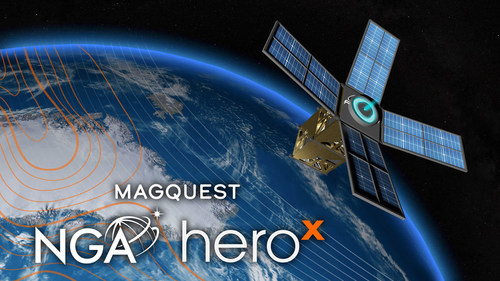Millions of Dollars to Help Accelerate Novel Approaches to Geomagnetic Data Collection for the World Magnetic Model
The National Geospatial-Intelligence Agency (NGA) just launched the Demonstration Phase (Phase 4a) of its MagQuest Challenge to develop novel data collection approaches for the World Magnetic Model.
The WMM ultimately ensures the accuracy of navigation because it corrects for differences in magnetic forces at a user's location. The model is used by thousands of systems for mobile navigation apps and is critical for military and commercial uses around the world.

Produced since 1905, the WMM originated with data collection from two ships surveying 500,000 miles of ocean. Today, the data is collected by satellites operated by the European Space Agency that will eventually reach the end of their useful life. NGA's MagQuest Challenge is promoting the development of miniaturized solutions to determine if they can produce data useful to support WMM production. NGA has an extensive network of government partners collaborating on the WMM production, including the National Oceanic and Atmospheric Administration, the British Geological Survey, the Federal Aviation Administration, the Department of Defense, the United States Geological Survey, and the United States Naval Observatory among others.
As part of its core mission, NGA provides geospatial intelligence products and services to decision makers, military service members, and first responders.
The MagQuest Demonstration Phase 4a will take place on HeroX, the social network for innovation and the world's leading platform for crowdsourced solutions. Three winning teams from Phase 3 of MagQuest each proposed a different magnetometer design to measure the Earth's magnetic field. In this next phase, these teams will receive several million dollars in awards, including a $1.55M Incentive Prize Purse, to develop their proposed magnetometers. NASA Goddard Space Flight Center will conduct independent testing on each team's prototype.
Following Phase 4a, successful teams will integrate their magnetometers into their satellites and launch their systems, acquire data and share their results with NGA.
"Our ultimate goal is for all three teams to successfully develop a magnetometer, each of which can be sent into orbit to determine viability for WMM production," said Mike Paniccia, NGA's program manager for the World Magnetic Model. "We want to test as many innovative and groundbreaking magnetometers as possible to ensure that NGA has a robust set of data suppliers to support the future of the WMM. We intend to have a competitive procurement for a data-buy contract following MagQuest and hope that these three teams, in addition to others from industry, will be able to supply comprehensive data sets to support the future of the WMM."
Three of the teams that participated in Phase 3 were selected to participate in Phase 4:
- Iota Technology, the first place Phase 3 winner, works alongside experienced teams from Oxford Space Systems and AAC Clyde Space. Their combined expertise in sensor technology, deployable structures, and mission design informed the design of their SIGMA solution – a 3U CubeSat featuring a novel deployable boom and a 3D magnetometer array.
- University of Colorado Boulder is one second place Phase 3 winner, and their solution, COSMO, leverages recent innovations in CubeSat technology and novel magnetometer technology. The University of Colorado Boulder team includes experts and faculty from the Department of Aerospace Engineering Sciences, the Department of Mechanical Engineering, and the Laboratory for Atmospheric and Space Physics, and they operate their missions entirely at the university, including using their own ground stations.
- Spire Global and SBQuantum joined forces and formed a partnership with a promising approach to become the other second place Phase 3 winner. SBQuantum's novel diamond-based quantum magnetometer technology is coupled with Spire's expertise and existing infrastructure in satellites, ground stations, and data processing to produce a unique solution.
"This MagQuest Challenge is a testament to the power of the crowd," said Kal K. Sahota, CEO, HeroX. "We are pleased to be part of securing the future of geomagnetic data collection and consequently contributing to the resilience and continued crucial work of the WMM."
For more information about the challenge, visit herox.com/MagQuest
ABOUT HEROX
HeroX is a platform and open marketplace for crowdsourcing innovation and human ingenuity, co-founded in 2013 by serial entrepreneur, Christian Cotichini and XPRIZE Founder and Futurist, Peter Diamandis. HeroX offers a turnkey, easy-to-use platform that supports anyone, anywhere, to solve everyday business and world challenges using the power of the crowd. Uniquely positioned as the Social Network for Innovation, HeroX is the only place you can build, grow and curate your very own crowd.
ABOUT NGA
NGA delivers world-class geospatial intelligence that provides a decisive advantage to policymakers, warfighters, intelligence professionals and first responders.
NGA is a unique combination of intelligence agency and combat support agency. It is the world leader in timely, relevant, accurate and actionable geospatial intelligence. NGA enables the U.S. intelligence community and the Department of Defense to fulfill the president's national security priorities to protect the nation.
For more information about NGA, visit us online at www.nga.mil, on Facebook or on Twitter.
Media Contact:
Alexandra Pony
press@herox.com
250.858.0656
SOURCE HeroX
